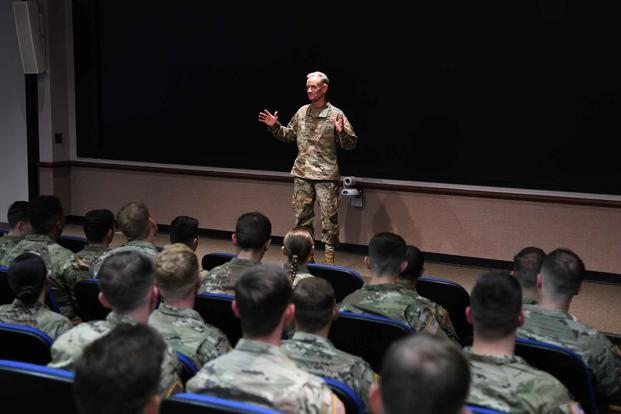The opinions expressed in this op-ed are those of the author and do not necessarily reflect the views of Military.com. If you would like to submit your own commentary, please send your article to opinions@military.com for consideration.
Even before withdrawal from Afghanistan and the strategic pivot toward competition with China and Russia, military planners grappled with the challenge of preparing for future wars.
One of the greatest challenges they must conquer is the fire hose of information that is already confronting troops, a deluge that's only going to thicken the fog of war. The military needs smart leaders to overcome that challenge, an uphill battle against a national culture that at times mocks intelligence.
We can expect to lose the technological advantage the U.S. military enjoyed in the post-Cold War era. All communications will either allow troops to be located and targeted or decrypted. Artificial intelligence (AI) will rapidly develop enemy courses of action after intercepting messages. This isn't science fiction anymore. The technology already exists, is available commercially, and is approaching readiness for wartime use.
While the scale and speed of combat increase with technology, the fundamentals of war remain. The immense amount of information made available by technology will not increase clarity as once predicted. It will make things more uncertain by increasing the speed, volume and detail of intelligence. Without the right people to add analysis, intuition and experience, commanders will quickly be overwhelmed by the data.
How will we find, fix and finish the enemy in the future? What must we do now to prepare ourselves?
We must leverage our most potent advantage: our people. Technology and information are tools; they have no value until wielded by sharp minds and skilled hands. A rifle is useless when shouldered by an untrained soldier, just as an AI-linked intelligence network will be. We must ensure today that we are promoting leaders with the capacity and talent to out-think the enemy and maximize the effectiveness of future technology. We must change how we evaluate our intellectual talent to ensure our ability to win on the battlefield of the future.
Unfortunately, the United States has an entrenched culture of anti-intellectualism. Minimal funding of public education, pop-culture stereotypes of intelligent people, and public disdain for scientists or "experts" by politicians, some media and the public are all evidence.
"The strain of anti-intellectualism has been a constant thread winding its way throughout political and cultural life, nurtured by the false notion that democracy means that 'my ignorance is just as good as your knowledge,'" Isaac Asimov, a biochemistry professor who authored some of the most significant works of science fiction of the 20th century, wrote in 1980. This is as true today as it was then.
If we want to prepare our military for growing complexity, we must counteract this mindset. It doesn't mean sacrificing strong leaders to make way for smart ones; it means expecting all leaders to be both. The Army must start rewarding academic success as much as high fitness scores. A few simple policy changes will make major strides to that end.
First, we must increase the importance of academic evaluation reports (AERs) for professional military education in assigning and promoting company-grade and noncommissioned officers. Motivated lieutenants who work hard and excel in the Basic Officer Leadership Course (BOLC) are not rewarded meaningfully. Captains who graduate at the top of their class enter the same queue for command positions as everyone else. One of the first lessons that young officers learn is that academics and intelligence are less important than being able to outrun your battalion commander.
An Army officer's first academic opportunity with tangible benefits is admission into the School of Advanced Military Studies (SAMS), for which they become eligible 10 years into their career. SAMS sets them apart from their peers and positions them to excel rapidly. Being labeled a "SAMS Grad" immediately identifies the officer as a high performer and future commander. That's too late. Ten years in, many exceptional officers have already resigned in favor of civilian careers.
Increasing consideration of AERs in promotion selection boards creates a system that considers individual academic success in conjunction with job evaluation reports. This would not prioritize weak leaders of high intellect. Instead, it should differentiate the most qualified candidates by giving board members insight into the soldier's academic and intellectual prowess.
Second, soldiers should be able to add published professional works to their personnel files. Contributions to professional periodicals such as "Military Review" or branch magazines demonstrate a professional stewardship and should be considered during promotions and assignments. Voluntary writing and research demonstrate an aptitude for self-development, critical thinking and communication skills, all of which are critical for leaders and are ineffectively evaluated by the existing evaluation report. Officer and enlisted record briefs also should include a note showing the number of qualifying published works. If a soldier is prolific or has demonstrated expertise in an area, they should be prioritized for relevant assignments.
With these changes, the Army would face our future enemies with an experienced roster of leaders raised in a warrior-scholar culture that expects and cultivates both physical and intellectual capacity. War will always be a fundamentally human endeavor. No technology can replace human decision-making and risk analysis. In the battlefield of the future, technology will increase available information, but only sharp minds and skilled hands can bring that information to bear.
Maj. Dan Dillenback is a military strategist with the U.S. Army currently pursuing a master's degree in public administration at Harvard University's Kennedy School of Government in Cambridge, Massachusetts.















